|
The final meeting of the 2014 session of the Council took place in Busan, Republic of Korea, on 18 October, ahead of the 19th Plenipotentiary Conference (PP-14), which opens its doors on Monday (20 October). Aboubakar Zourmba, Deputy Director-General of Cameroon's Telecommunications Regulatory Agency, and Chairman of the 2014 session of the Council, and ITU Secretary-General Dr Hamadoun I. Touré welcomed participants. Both men pointed to a very busy and productive period since the Council met in May this year. Dr Touré updated the Council on the Union's activities. Following are excerpts adapted from his speech and the Council's closing discussions.
Radiocommunication Sector (ITU-R)
In ITU-R, preparations for the World Radiocommunication Conference in 2015 (WRC-15) are moving full steam ahead, with all ITU-R studies on the technical and regulatory aspects on agenda items for WRC-15 now finalized. The Conference Preparatory Meeting in March 2015 will review these studies and compile a report that will serve as a basis for Member States to prepare their proposals to WRC-15.
New and revised Recommendations for radiocommunication services include recommendations on systems for terrestrial digital sound broadcasting and a recommendation for a satellite carrier identification system.
IMT-Advanced is evolving to IMT-2020 within the foreseen timescales, with further evaluation processes and consensus building expected to establish the global framework for the deployment of mobile broadband services.
The Radiocommunication Bureau (BR) has continued to improve the efficiency of the processing of terrestrial service notices, having processed more than 47,000 new terrestrial notices from June to September 2014.
Telecommunication Standardization Sector (ITU-T)
In ITU-T, a new Focus Group on Digital Financial Services was established to develop a standardization road map to improve and boost interoperable mobile money services. The group will also develop a regulatory toolkit to help national policy-makers and regulatory authorities encourage the adoption of these standards. Also, a new Focus Group on Aviation Applications of Cloud Computing for Flight Data Monitoring will study the requirements for standards to enable an "aviation cloud" for real-time monitoring of flight data.
Another highlight is the ITU Kaleidoscope Academic Conference 2014, held in June at the invitation of the Russian Federation’s Ministry of Communications and Mass Media and hosted by the Bonch-Bruevich Saint-Petersburg State University of Telecommunications. This year’s winning paper is titled “Towards Converged 5G Mobile Networks – Challenges and Current Trends.”
ITU's fourth "Green Standards Week", held in Beijing, China, in September concluded with a call for stronger cooperation between the energy and ICT sectors. The event raised awareness of the importance of using information and communication technologies to build smart sustainable cities and ensure a sustainable future for all.
Recent major publications include: "Understanding patents, competition and standardization in an interconnected world", which provides an introduction to standardization and intellectual property systems and a Technology Watch Report titled "Tactile Internet", articulating a vision of a future Internet characterized by low latency high availability, reliability and security.
A new ITU-T Global Portal was also launched, with special focus on activities in the Africa, Asia-Pacific, Arab and Americas regions.
Telecommunication Development Sector (ITU-D)
In ITU-D, the Secretary-General said that the main focus has been on implementing decisions from the World Telecommunication Development Conference (WTDC-14), held earlier this year in Dubai, United Arab Emirates. In June, a retreat of the senior management of the Telecommunication Development Bureau (BDT) was organized to ensure the effective implementation of these decisions.
Other activities cited by the Secretary-General include the 14th Global Symposium for Regulators in Manama, Bahrain in June, held under the theme of "Capitalizing on the potential of the digital world". The event attracted more than 700 leading specialists from 113 countries worldwide.
A Cooperation Agreement was also signed between ITU, 11 Pacific Island countries and satellite partners to provide connectivity to remote islands and rural areas to access ICT for development and for emergency telecommunications.
The recent meetings of study groups 1 and 2 in September marked the beginning of a new study cycle for ITU-D. Hot on the heels of these meetings, the Telecommunication Development Advisory Group (TDAG) met and agreed to create a group on the Strategic Plan, Operational plan and Declaration; a group on the Rules of procedure of ITU-D; and an inter-sectoral team on issues of mutual interest to all ITU's three Sectors.
Looking ahead, preparations are progressing well for the 12th edition of the World Telecommunication and ICT Indicators Symposium, which will be held in Tbilisi, Georgia, on 24-26 November, and which will also see the launch of the 2014 edition of the flagship report "Measuring the Information Society".
Cross-sectoral initiatives The WSIS+10 High-Level Event, held in Geneva in June as an extended version of the annual WSIS Forum, attracted more than 1600 WSIS stakeholders from over 140 countries, with thousands joining in via remote participation. The event was an opportunity to provide a shared vision for the way forward beyond 2015. High-level representatives of the wider WSIS stakeholder community graced the Forum, with more than 100 ministers, and many deputies, ambassadors, CEOs and civil society leaders contributing passionately to the programme.
In September, the Broadband Commission for Digital Development held its tenth meeting in New York. Referring to "The State of Broadband 2014" report released at this meeting, Dr Touré described it as "a unique global snapshot of broadband network access and affordability, with country-by country data measuring broadband access against key advocacy targets set by the Commission."
Dr Touré then drew attention to the online platform developed for Costa Rica, allowing the country to engage members of the public in creating a new ITU resolution on Youth. "In addition to Costa Rica's proposal, it is good to see so many regions placing high priority on youth, with new draft resolutions on this topic being proposed by the Americas, Europe and Arab States," Dr Touré stated, concluding his remarks.
WSIS+10 High-Level Event and its outcomes
Three documents were then presented to the Council for consideration. One was the report on the WSIS+10 High-Level Event and its outcomes (C14/110). Presenting this document, the ITU secretariat (Jaroslaw Ponder) drew attention to three additional documents that had been requested by the Council Working Group on the World Summit on the Information Society (CWG-WSIS) for submission to Council 2014 and PP-14. These are: WSIS+10 Statement on the Implementation of the WSIS Outcomes and WSIS+10 Vision for WSIS beyond 2015 (C14/INF/25), WSIS+10 Report: ITU's ten year contribution to the WSIS implementation and follow-up (2005-2014) (C14/INF/26), and the Final WSIS target review: Achievements, challenges and the way forward (C14/INF/27).
The Chairman of the Council Working Group on WSIS, Professor Vladimir Minkin, presented two reports: a Report on the outcomes of the group's meetings since the last Plenipotentiary Conference 2010 (C14/112), and a Summary of the 25th meeting of CWG-WSIS (C14/113).
A few observations were made by delegates. The term "Gender Equality Mainstreaming" should be used throughout WSIS-related documents, instead of Women's Empowerment. The 2014 edition of the annual ICT4All Forum, held in September in Tunisia, generated a set of recommendations related to the follow-up of WSIS. These have been considered by CWG-WSIS when developing its own final recommendations to the Busan Council 2014 meeting.
The WSIS+10 Multistakeholder Preparatory Platform, set up to develop drafts of the WSIS+10 Outcome Documents, namely, WSIS+10 Statement on the Implementation of the WSIS Outcomes and WSIS+10 Vision for WSIS beyond 2015, has proved to be an effective mechanism for developing consensus-based texts in the ICT ecosystem. Outcomes of the WSIS+10 High-Level Event should be submitted to the United Nations' Commission on Science and Technology for Development (CSTD) and the United Nations General Assembly. The outcomes of the work of CWG-WSIS are impressive, and significant efforts of its Chairman as well as ITU membership contributing to the ongoing work of the group should be appreciated. CWG-WSIS should be encouraged to continue its efforts in providing strategic guidance and recommendations to the Council in the future.
ITU Secretary-General recalled the origins of the WSIS process and the key role ITU has played since its inception. He underlined ITU's continued commitment to the implementation of WSIS outcomes. He stressed the importance of WSIS for the development of the multistakholder approach that has been evolving since inception of the WSIS process. He also encouraged all stakeholders to continue contributing to the global dialogue on ICT and the WSIS process, while making the transition from the information society to a knowledge society a reality.
The Council noted all documents presented on this topic, including all the final recommendations and proposals contained in them. It decided to forward to PP-14 the Report on the outcomes of the group's meetings since the last Plenipotentiary Conference 2010 (C14/112).
Financial operating report for the year 2013
The Council examined and approved the audited Financial Operating Report for the Financial Year 2013 (Document C14/26 (Rev.1). The report, presented by Jordane Galasso, covers the audited accounts for voluntary contributions, technical cooperation projects, ITU Staff Superannuation and Benevolent Funds, audited accounts for the regular budget for 2013 and the situation of the ITU TELECOM accounts at 31 December 2013.
Income for the regular budget in 2013 totalled CHF 163.4 million (compared with CHF 159.7 million in 2012). Actual expenditure at 31 December 2013 amounted to CHF 155.8 million (against CHF 165.4 million in 2012). The implementation of the 2013 budget resulted in an operating surplus of CHF 2.1 million (against an operating deficit of CHF 5.7 million in 2012).
This means that for the 2012-2013 biennium, CHF 5.7 million were withdrawn from the Reserve Account in 2012 as part of the approved withdrawal of CHF 8.6 million over the biennium 2012-2013. No further withdrawal was made in 2013 (despite the possibility to do so). The Reserve Account has been increased by the CHF 2.1 million budgetary surplus in 2013. At 31 December 2013, the Reserve Account stood at CHF 30.3 million representing 19.3 per cent of the 2013 budget, an improvement of 7.5 per cent in comparison to 2012.
The secretariat pointed out that thanks to timely payments by most of the Union's contributors, liquidity remained satisfactory throughout the year. About 95 per cent of assessed contributions invoiced for the year 2013 had been received by 31 December 2013.
On the operating side, the main indicators show the Union's financial situation to be sound, despite a tight budget and accounts receivable provisioned (arrears, special arrears accounts and closed special arrears accounts as well as other overdue receivables) amounting to CHF 57.3 million at the end of 2013, an improvement of 5.45 per cent compared to 2012. The Reserve for Debtor's accounts currently covers 100 per cent of total arrears.
Other funds in the consolidated net assets at 31 December 2013 include the Investment, Welfare and Centenary funds (CHF 7.2 million) as well as Staff Superannuation and Benevolent Funds Complement, Provident and Assistance Funds (CHF 7.9 million), the After-Service Health Insurance (ASHI) fund (CHF 2 million), the Health Insurance Guaranty Fund (CHF 2 million), the ITU Telecom Exhibition Working Capital Fund (CHF 9.9 million), and extra-budgetary funds (CHF 6.7 million allocated to projects and CHF 1.9 million in the process of being allocated to projects).
The 2013 budgetary surplus was achieved by rigorous management of ITU resources, including a limited number of early separation packages on a case-by-case basis, with non-replacement of the position held by the staff when this was beneficial for the Union. A priority for ITU is to achieve positive net assets. To reach this goal, the Union is committed to ensuring the financing of its health insurance scheme on a pay-as- you-go basis as well as the long-term funding of the ASHI obligation, taking into account the variations in actuarial assumptions. This has resulted in the constitution of funds, an increase in the contribution rate, as well as a decision to change from the current health insurance scheme to a scheme administered by a private insurer. This change is mainly prompted by the need for cost containment as well as for an optimized analysis and monitoring of expenses.
In 2013, expenses related to the delivery of Trust funds projects - projects financed by earmarked contributions - amounted to CHF 13.8 million (CHF 8.5 million in 2012) generating CHF 1.1 of project support revenue (CHF 0.6 million in 2012). Cash contributions amounted to CHF 6 million in 2013 (CHF 5.1 million in 2012). Voluntary cash contributions received for various activities amounted to CHF 2.1 million during the year 2013 (CHF 1.5 million in 2012).
At year end, unused available funds from third parties amounted to CHF 28.2 million (CHF 38.6 million in 2012) and are reported as liabilities against third parties.
Funds available from the Information Communications and Telecom Development Fund (ICTDF) to support various projects at global, national and regional level amounted to CHF 1.5 million at 31 December 2013 (CHF 3.5 million at 31 December 2012). The May 2014 Council session approved the withdrawal of USD 2 million from the Exhibition Working Capital Fund to the ICTDF Capital account.
Following this presentation, the Council noted the financial operating report for 2013, examined the External Auditor's reports on the accounts for 2013 and approved these accounts as audited.
Accounts of ITU Telecom World 2013The Council also approved the audited accounts of ITU Telecom World 2013.Alassane Ba, Chief, Financial Resources Management Department, presenting the report containing the audited results recalled that ITU Telecom World 2013 was held in Bangkok in November 2013 with the theme "Embracing Change in a Digital World". About 6000 participants attended the event, including high-level officials from both the government and industry (ministers, CEOs, regulators) and young visionaries from around the world. There were 169 Showfloor participants from 33 countries, 22 national and thematic pavilions, and 58 forum sessions.
The final ITU Telecom World 2013 budget was approved on 27 September 2013, with a projected total revenue of CHF 11 million and an estimated total expenditure of less than CHF 9.7 million, forecasting an event result of CHF 1.3 million, thanks to significant monetary and in-kind contributions made by the host country, Thailand and by diverse sponsors.
The statement of financial performance at 31 December 2013 shows a surplus of CHF 1.8 million. Actual revenue posted to account amounted to CHF 11.394 million, while actual costs amounted to CHF 9.539 million. Outstanding receivables at 31 December 2013 amounted to a total of CHF 1.1 million. By the end of March 2014, all receivables outstanding as of 31 December 2013 had been paid.
As the host country for ITU Telecom World 2012 in Dubai, the United Arab Emirates welcomed this positive result, adding that the event is of utmost importance for the Union. The United Arab Emirates has put forward a proposal to PP-14 for discussion. Switzerland said it looked forward to the discussion at PP-14, stressing that Telecom surplus funds, which are contributing to the Information Communication and Telecom Development Fund are particularly important for developing countries.
The Council also noted the report of the External Auditor on ITU Telecom World 2013 (Document C14/106).
Suspension or removal of ITU Sector Members, Associates and AcademiaIn line with the decisions of the ITU Plenipotentiary Conference and the Council regarding suspension procedures, notably Resolution 152 (Rev. Guadalajara, 2010), entities that had not paid their contributions by the end of September 2014 have been suspended as from 1 October 2014 until receipt of payment.
Alassane Ba, Chief, Financial Resources Management Department, presented a list, updated at 30 September 2014, of 24 Sector Members, 14 Associates and 6 Academia in arrears with their contributions due for payment on 31 March 2014 (Document C14/107).
Since 2011, the Council has granted the Secretary-General a temporary flexibility not to systematically remove suspended Sector Members, Associates and Academia, on the condition that the spirit of Resolution 152 is respected. The secretariat asked for continued support from relevant administrations in following up entities in arrears with their contributions.
Report by the Chairman of the Council Working Group on Financial and Human ResourcesBruce Gracie, Chairman of the Council Working Group on Financial and Human Resources introduced the group's' report (Document 108), saying that it contained proposed revisions to the following four resolutions:
- Resolution 152 (Rev. Guadalajara, 2010), on "Improvement of management and follow-up of the defrayal of ITU expenses by Sector Members and Associates".
- Resolution 158 (Rev. Guadalajara, 2010) on "Financial issues for consideration by the Council".
- Resolution 169 (Guadalajara, 2010) on the "Admission of academia, universities and their associated research establishments to participate in the work of the three Sectors of the Union."
- Resolution 170 (Guadalajara, 2010) on the "Admission of Sector Members from developing countries to participate in the work of the ITU Radiocommunication Sector and the ITU Telecommunication Standardization Sector".
The Council agreed to forward these revised resolutions to PP-14 for consideration.
Advantages and disadvantages of using revenue generated from international numbering resources for the purpose of balancing revenue and expensesThe Council has decided to forward to PP-14 the report on the "Advantages and disadvantages of using revenue generated from international numbering resources for the purpose of balancing revenue and expenses," (Document C14/111), along with all the comments made by delegations during discussion.
Council 2014 at its May session had instructed the Director of TSB to invite ITU-T Study Group 2 to set up an Expert Group to review the assignment criteria for international numbering resources (INRs) that ITU assigns in order to introduce more flexibility to respond to market changes. The Council also requested the Director of TSB to prepare this report for its Busan final session.
Reinhard Scholl, Deputy to the TSB Director, recalled that the request for this report was made recognizing that the draft financial plan of the Union for 2016-2019 foresees revenues of CHF 7 million for INR services, which is a higher amount than what is obtained at present from those services.
The report takes account of the discussions in the Expert Group which held five meetings, the last one taking place on 22 August.
Among other things, the report outlines various options that could be used to generate the CHF 7 million envisaged in the draft financial plan.
INRs are indispensable to the operation of telecommunication networks and services. Operators use INRs to provide services and usually generate profits (sometimes significant profits) from those services.
At present, ITU provides most INRs either free of charge, or for a nominal one-time charge, and costs exceed revenues by approximately CHF 700 000 per year. Most INRs are provided to members and non-members. Some INRs are provided only to members. However, it is estimated that at least 1000 operators using INRs are not members of ITU and do not pay any fees to ITU, even if they pay fees to national administrations.
"Although the charges envisaged in the report would appear to be minor compared to the revenues that operators derive from INRs, a detailed analysis has not been made as the Council did not request it and funds were not made available. A detailed implementation plan was also not called for, but would need to be prepared should the Council decide to proceed. If the Council were to identify one or more preferred options then these would be studied in more depth, including modalities for implementation," Mr Scholl explained, presenting the report.
Highlighting that the report identifies advantages and disadvantages, he mentioned one proposal made in the Expert Group, which is "to use this funding to assist the participation by developing countries in the work of ITU-T and improve the performance of ITU-T and its members in dealing with this complex subject, recognizing that some numbering resources are a scarce and valuable resource."
Comments from the floor were diverse.
Some expressed concern over potential double jeopardy, if operators are charged twice for international numbering resources by ITU and by administrations, and that a distinction should be made between numbers assigned directly by ITU and those by administrations.
Others said that there were many more advantages than disadvantages. ITU incurred expenses in assigning INRs, and the revenue generated could be used to balance the budget and for the benefit of developing countries, for example.
Another view was that it is premature to take a decision on the matter and a suggested way forward would be to set up a Council Working Group.
Follow-up to TSAG discussions on the work carried out by the correspondence group on the elaboration of a working definition of the term "ICT"
Reinhard Scholl, TSB, presented Document C14/109 on follow-up to TSAG discussions on the work carried out by the correspondence group on the elaboration of a working definition of the term "ICT". According to the report of the TSAG meeting 17-20 June 2014, "All ITU-T SG chairmen agree unanimously that the proposed working definition of 'ICT' is not yet mature enough. In particular, while they have no concerns with the basic working definition text, they have concerns with the descriptive narrative which qualifies the working definition as follows: 'The working definition is not intended to include content, services, software, or applications; interfere with the security or integrity of networks or personal data […]'. These limits placed on the working definition are in conflict with the work authorized by WTSA-12 of several ITU-T study groups that include content, services, software, applications, security or integrity of networks. These work areas have been core to the ITU-T study groups for many past study periods. The Standardization Committee for Vocabulary (SCV) in a virtual meeting had come to the same conclusion."
Following this presentation, Morocco said that the definition had its limitations and that it would hamper the development of standards. The United States, which supports the definition, underlined that the definition and guidelines go hand in hand as a package deal and should be left together. The United Arab Emirates, which had submitted a document to Council 2014 in May, commented that it had the same misgivings as those expressed in the TSAG report.
The discussion on this matter will continue in PP-14.
The meeting closed, with the Secretary-General awarding the Gold Medal to Council Chairman, Mr Zourmba for his leadership, wisdom and experience.
|
Quick Links
Photos and videos
Council 2014 Video Highlights
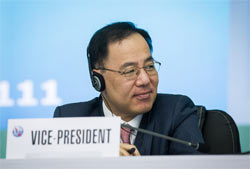
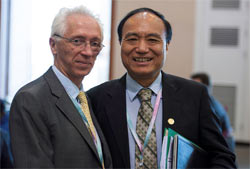
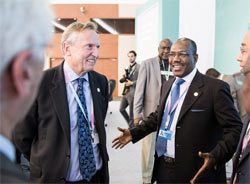
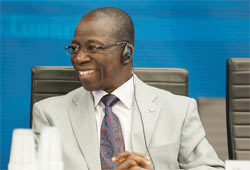
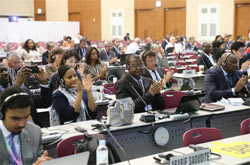
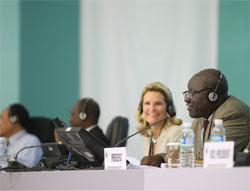
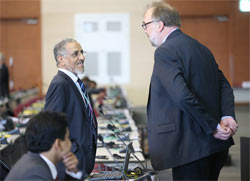
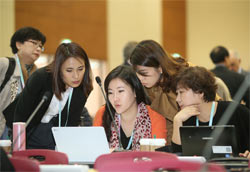
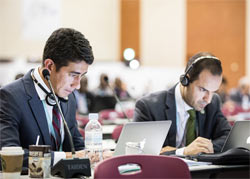
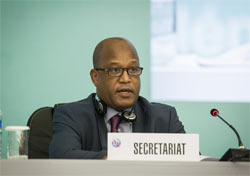
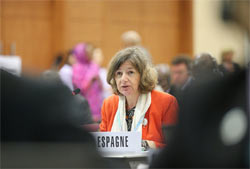
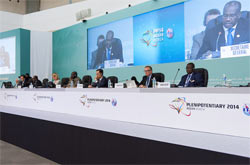
|
